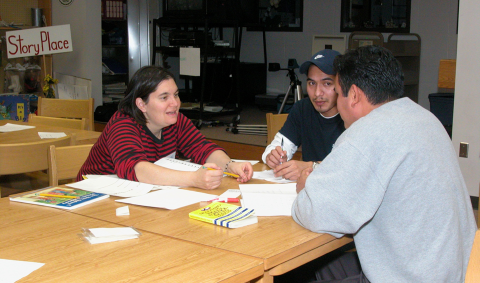West Liberty Adult and Family Tutoring
A tutoring program that genuinely listens and responds to immigrant families’ needsParticipants
- University of Iowa undergraduate and graduate students
- Human resources staff from West Liberty Foods
- Local high school students
- Adult graduates of the program
Costs
- $500-2000 in teaching materials
Time resources
Approximately 4 months (October 1992 to January 1993) to design the initial program’s year-round tutoring sessions held once a week (every Thursday).
Other resources
Small grants were initially necessary to start-up the program. All tutors are volunteers. The local schools provide a space to meet and allow the use of the schools’ library and computers.
Direct Partners
- Ganas’s Moving Forward Together
- The University of Iowa
- The Obermann Center at the University of Iowa
Our Story: "One needs to resist taking on the role of “helper” or missionary."
Teach grammar to me first and then I will decide whether it is important.
Benefits
Creating a tutoring program in West Liberty allowed immigrant parents an opportunity to be part of their children’s academic life. This tutoring program promotes innovative and creative thinking that gives the adults the opportunity to shape the tutoring curriculum as they see fit. Giving the adult students authority over what is to be done in each session motivates them. This way, the program challenges on-going stereotypes about immigrant parents and their lack of interest in their child’s education. This program also helped create a childcare program, that also teaches young children basic skills in the classroom. The reliable nature of the program gives parents continuity and helps bridge gaps between schools and newcomers, beyond those grounded in language barriers. The university students who volunteer tutor gain valuable practice in their development as elementary education teachers.
Challenges
When the program started, professors and school professionals did not think it’s plan of collaborative curriculum development would work. Such disagreement made it hard to develop a program that benefited the immigrant population. Adults from the program also questioned volunteers’ intentions. The program would work even better if tutoring sessions could be offered more than once a week, but it is hard to coordinate and staff such an effort.
Things to Remember
- Make a long term commitment to a program in order to make a difference.
- Allocate adequate time for contact with the students–one night a week is not really enough.
- Challenge assumptions and stereotypes about immigrant parents and their involvement in their children’s education.
